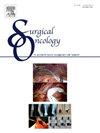Neoadjuvant intraperitoneal chemotherapy in high-risk and cytology positive gastric cancer: a systematic review
IF 2.4
4区 医学
Q3 ONCOLOGY
引用次数: 0
Abstract
Background
Gastric cancer has a risk of early transcoelomic spread. Despite perioperative chemotherapy and surgery, peritoneal recurrence is a frequent contributor to mortality. The addition of neoadjuvant normothermic intraperitoneal chemotherapy (IPC) allows early treatment of microscopic disease. Our study aims to systematically evaluate the safety and efficacy of neoadjuvant IPC in patients with gastric cancer who are at high risk of peritoneal recurrence.
Methods
A systematic review was conducted according to the PRISMA guidelines. Embase, PubMed, Web of Science and Scopus were searched for relevant papers. The primary outcomes were the rates of disease-free (DFS) and overall survival (OS) among patients treated with neoadjuvant IPC. Secondary outcomes focused on adverse effects and toxicity.
Results
Overall, 562 manuscripts were screened and 7 papers were included, totalling 158 patients. For cytology-positive patients, the addition of IPC led to a conversion to negative cytology and radical surgery in 78–89 %. This was associated with relatively high DFS and OS. Peritoneal-specific recurrence was higher in cohorts who initially had cytology-positive disease (63–69 %) compared to those who did not (0–29 %). Our data suggest that OS is lower in patients who were initially cytology-positive compared to cytology-negative disease. Importantly, neoadjuvant IPC did not appear to significantly increase treatment-related adverse events.
Conclusion
Our results suggest that the neoadjuvant IPC has efficacy and is safe, with high rates of cytology conversion (in cytology-positive disease), low rates of peritoneal recurrence (in locally advanced disease). This was associated with substantial improvements in DFS and OS, compared to current standard treatment regimens.
新辅助腹腔化疗在高危和细胞学阳性胃癌中的应用:系统综述
背景:胃癌具有早期跨结肠扩散的风险。尽管围手术期化疗和手术,腹膜复发是一个常见的死亡因素。新辅助常温腹腔化疗(IPC)的加入使显微镜下疾病的早期治疗成为可能。本研究旨在系统评价新辅助IPC在腹膜复发高危胃癌患者中的安全性和有效性。方法根据PRISMA指南进行系统评价。检索了Embase、PubMed、Web of Science和Scopus等相关论文。主要结局是接受新辅助IPC治疗的患者的无病率(DFS)和总生存率(OS)。次要结局集中于不良反应和毒性。结果共筛选论文562篇,纳入论文7篇,共158例患者。对于细胞学阳性的患者,添加IPC导致78 - 89%的患者转化为细胞学阴性并进行根治性手术。这与相对较高的DFS和OS相关。在最初患有细胞学阳性疾病的队列中,腹膜特异性复发率(63 - 69%)高于未患有细胞学阳性疾病的队列(0 - 29%)。我们的数据表明,与细胞学阴性的疾病相比,最初细胞学阳性的患者的OS较低。重要的是,新辅助IPC似乎没有显著增加治疗相关不良事件。结论新辅助IPC有效且安全,细胞学转换率高(细胞学阳性疾病),腹膜复发率低(局部晚期疾病)。与目前的标准治疗方案相比,这与DFS和OS的显著改善有关。
本文章由计算机程序翻译,如有差异,请以英文原文为准。
求助全文
约1分钟内获得全文
求助全文
来源期刊

Surgical Oncology-Oxford
医学-外科
CiteScore
4.50
自引率
0.00%
发文量
169
审稿时长
38 days
期刊介绍:
Surgical Oncology is a peer reviewed journal publishing review articles that contribute to the advancement of knowledge in surgical oncology and related fields of interest. Articles represent a spectrum of current technology in oncology research as well as those concerning clinical trials, surgical technique, methods of investigation and patient evaluation. Surgical Oncology publishes comprehensive Reviews that examine individual topics in considerable detail, in addition to editorials and commentaries which focus on selected papers. The journal also publishes special issues which explore topics of interest to surgical oncologists in great detail - outlining recent advancements and providing readers with the most up to date information.
 求助内容:
求助内容: 应助结果提醒方式:
应助结果提醒方式:


